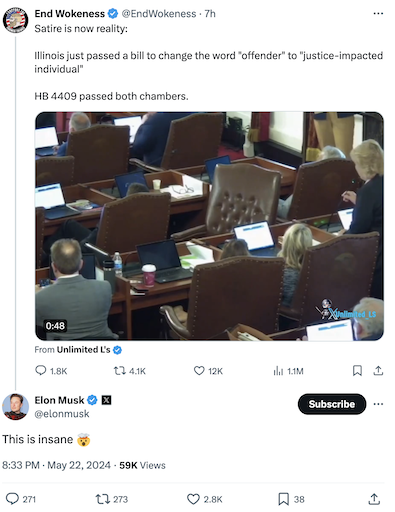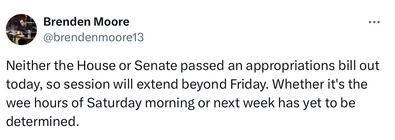|
Ozinga campaign aide charged with harassing Sen. Hastings with obscene images (Updated x3)
Thursday, May 23, 2024 - Posted by Rich Miller * Isabel and I have also been working on this story…
* Pawula was not Ozinga’s chief of staff when Ozinga abruptly resigned without explaining his reasons. But he had worked in Ozinga’s district office prior to that and is currently listed as treasurer of Ozinga’s campaign committee. He’s also listed as treasurer of Ozinga’s Big Tent Coalition PAC. Ozinga and Sen. Hastings have been political adversaries. The Illinois State Police opened an investigation after Sen. Hastings filed a complaint. The results of that investigation were then turned over to the attorney general’s office, which ultimate filed these charges in Will County…
Pawula’s booking photo…  * Pawula could not be reached and he has no attorney on file in Will County. Ozinga did not respond to phone calls and text messages, which included these questions…
I’ll be happy to update with any response. Ozinga has not been charged. Pawula’s first court date is June 5. * Meanwhile, Jeff Berkowitz recently interviewed Ozinga and sent out this press release…
I’m thinking maybe not. Watch the interview here. *** Adding *** Tim Ozinga texted me this response…
*** Adding *** Click here to see Pawula’s notice to appear. Something to note, the date of the offense is November 8, 2022, the day of the general election. *** Adding *** It turns out that Ozinga put Pawula back on staff. I kid you not. I circled back to Ozinga and here’s what he said…
|
|
Isabel’s afternoon roundup
Thursday, May 23, 2024 - Posted by Isabel Miller * Sun-Times…
* Attorney General Kwame Raoul…
* KMOX | Illinois Judge: State has ’successfully turned the Titanic’ with cash bail reform: “This is an overhaul of a system I’ve known in my 40 years of my legal career,” said Andrew Gleeson, Chief Judge in the 20th Judicial Circuit in Illinois in 2023 on Total Information A.M. when the decision initially happened. Months later, has it changed criminal justice system in Illinois for the better or for worse? “I think as of now, you’d have to say yes, it’s changed for the better” said Gleeson on Total Information A.M. Wednesday. * Crain’s | Chicago newsrooms get $1.6 million in grants to strengthen local journalism: The newsrooms receiving the funding are Borderless Magazine, Chicago News Weekly, Cicero Independiente, Growing Community Media, Injustice Watch, Investigative Project on Race & Equity, Invisible Institute, Lansing Journal, La Raza Chicago, Reparations Media NFP, Respair Production & Media, South Side Weekly and the Windy City Times. Each news group has a different plan for using the money, ranging from hiring staff to creating hard copy reports for distribution. Each of the participating newsrooms has an operating budget of less than $2 million and prioritizes “amplifying community voices,” among other criteria. * Sun-Times | CTA unveils ideas for open space under revamped L tracks in Edgewater, Uptown: Skate parks, dog parks, fitness spaces, playgrounds, walking paths and areas for outdoor markets, all shaded under L tracks on the North Side. Those were some of the proposals in the Chicago Transit Authority’s vision for more than a mile of new open space under renovated Red Line tracks stretching from West Lawrence to West Ardmore avenues in Edgewater and Uptown. * Crain’s | Lagunitas is moving its brewing operations out of Chicago: The Lagunitas Brewing Company is moving its Chicago brewing operations to Petaluma, Calif. The brewery will maintain operations of its Chicago warehouse but is closing its Chicago tap room in Douglas Park. “The changes were prompted by a need to future-proof the organization amid changing tides in the craft beverage industry,” the company said in a statement. “The transition will allow for a more efficient and flexible supply chain, with a greater focus on innovation and the acceleration of more sustainable brewing practices.” * Daily Herald | Hanover Township offering free summer lunches to youth: Hanover Township is partnering with the Northern Illinois Food Bank to provide free lunches to youth beginning Monday, June 3, at the Township’s Astor Avenue Community Center, 7431 Astor Ave., Hanover Park and at the Izaak Walton Youth Center, 899 Jay St., Elgin. Lunches will be available Monday through Friday between the hours of 11 a.m. and 1 p.m., at the Youth Center and 11:30 a.m. and 1 p.m., at the Community Center. No registration is required. * NBC Chicago | Wayfair’s first-ever physical store opens in Wilmette with freebies, giveaways: According to Wilmette village president Senta Plunkett, the store is expected to have a “transformative effect” on the suburb. “It will be our largest sales tax generator,” Plunkett told NBC Chicago in an interview. “We’re excited to be able to reinvest those sales tax dollars into our infrastructure. It’s a big deal here.” * Sun-Times | Cook County jury rules Zantac not the cause of Brookfield woman’s colon cancer: Jurors deliberated for just over four hours from Wednesday afternoon to Thursday morning. The three-week long trial — a first of thousands of similar cases nationwide to appear before a jury — wrapped up Wednesday. Lawyers laid out two starkly different arguments in their final pitches to the jury of nine women and three men. They did agree she proved she took Zantac for nearly 20 years, but they did not find it was the cause of her colon cancer. * WTTW | Some Landscapers Say Evanston’s Gas-Powered Leaf Blower Ban Created a Tense Atmosphere, With the Public and Fellow Landscapers Submitting More Than 1,000 Violations: Tom Klitzkie, president and co-owner of Nature’s Perspective Landscaping, who runs what he has called the “largest landscaping business in Evanston,” served as a member of the city’s Environmental Board. That board helped advise the Evanston City Council on legislation directly impacting his own company: the city’s controversial ban on gas- and propane-powered leaf blowers. In turn, Klitzkie is one of the top submitters of leaf blower violation complaints involving other landscaping companies. He’s the second most frequent submitter, accounting for 283 of the whopping 1,385 submissions made to the city as of April 25. Most of the submitters — 640 — left their name blank. 122 are under “hire reputable landscapers.” * The Telegraph | Collinsville hosts Illinois GOP state convention this weekend: Unlike a national convention, which is focused on selecting a presidential candidate, the state convention is about networking and training. Approximately 500 to 600 people will attend, according to Convention Coordinator Deb Detmers. * ABC Chicago | Rare blue-eyed cicada donated to Field Museum: ‘One in a million’: A rare blue-eyed cicada found by a suburban family has been donated to Chicago’s Field Museum. A 4-year-old, Jack Bailey, from Wheaton discovered it. His sister noticed it had blue eyes. The family took pictures of the cicada and then released it back into the yard. Later, they discovered how rare blue-eyed cicadas are, so they found it again. * WCIA | ‘I’m staying inside’: Decatur neighborhood reacts to cicada influx: People have been doing all they can to try to keep their yards clear of the bugs and what they leave behind, but Tapscott says when they start cleaning in the morning — by the next day it looks like nothing was done. “There’s not much you can do about them. It’ll be nice when they’re gone. Because its very noisy,” said Tapscott. * AP | Political consultant behind fake Biden robocalls faces $6 million fine and criminal charges: The Federal Communications Commission said the fine it proposed Thursday for Steven Kramer is its first involving generative AI technology. The company accused of transmitting the calls, Lingo Telecom, faces a $2 million fine, though in both cases the parties could settle or further negotiate, the FCC said. * USA Today | Activist Rev. Al Sharpton issues stark warning to the FTC about two gambling giants: In the letter, obtained by USA TODAY Sports, Sharpton writes to FTC Chair Lina Khan that the domination of the two gambling platforms threatens consumer protection in the market. “As you are well aware, DraftKings and FanDuel dominate the online sports betting market in the United States,” Sharpton wrote. “As of September 2023, they had a combined market share of approximately 75% in mobile sports betting. Their Sports Betting Alliance (SBA), which includes fellow legacy operators BetMGM and Fanatics Sportsbook, likely controls close to 90% of the market now. * Crain’s | Durbin renews call for Alito to recuse himself in 2020 election cases: Referring to a New York Times report that the “Appeal to Heaven” flag was seen flying outside Alito’s New Jersey vacation home — news that follows revelations that an upside-down American flag had been displayed at the conservative justice’s Virginia residence — Durbin argued tonight that the incidents “further erode public faith in the court.”
|
|
New bill could prohibit infamous ‘pink slime’ sites from publishing any more voter registration data
Thursday, May 23, 2024 - Posted by Rich Miller * Background is here if you need it. From the elections omnibus bill…
As we’ve already discussed, the attorney general has sued Local Government Information Services over their publishing of the data. I’m still looking through the omnibus bill. Have you found anything?
|
|
It’s just a bill
Thursday, May 23, 2024 - Posted by Isabel Miller * WAND…
* WAND…
* WTVO…
* Rep. Adam Niemerg….
* WAND…

* Sen. Javier Cervantes…
|
|
Showcasing the Retailers Who Make Illinois Work
Thursday, May 23, 2024 - Posted by Advertising Department [The following is a paid advertisement.] Retail provides one out of every five Illinois jobs, generates the second largest amount of tax revenue for the state, and is the largest source of revenue for local governments. But retail is also so much more, with retailers serving as the trusted contributors to life’s moments, big and small. We Are Retail and IRMA are dedicated to sharing the stories of retailers like Martin, who serve their communities with dedication and pride.
|
|
Pritzker on Choate, his health care bill and the sports betting tax
Thursday, May 23, 2024 - Posted by Rich Miller * Background is here if you need it. From the governor’s Q&A today…
* More questions from other reporters…
|
|
Investment In Carbon Capture Technology Will Help Grow Illinois’ Corn Industry, Spur Job Creation, And Keep Nation ‘Fed and Fueled’
Thursday, May 23, 2024 - Posted by Advertising Department [The following is a paid advertisement.] Labor unions, government officials, business voices, and the academic community are speaking up about the critical role that carbon capture and storage (CCS) can play in helping Illinois reach its clean energy goals. The Capture Jobs Now Coalition is supporting SB3311/HB569 to advance CCS projects, prioritizing jobs and economic development in local communities. Matt Rush, Farmer from Fairfield and Past President of the Illinois Corn Growers Association:
Joe Heinrich, Executive Director of the Smart Carbon Network and Rick Terven, Jr., Legislative & Political Director for the Illinois Pipe Trades Association:
For more information visit CaptureJobsNow.com.
|
|
Listen To Servers – Vote No On House Bill 5345
Thursday, May 23, 2024 - Posted by Advertising Department [The following is a paid advertisement.] Dominique Juarez, a server at Alexander’s Steakhouse in Peoria, said at the news conference she opposes the elimination of tip credit and that the bill “corners us into a no-win situation.”  Dominique with some of her regular customers at Alexander’s Steakhouse in Peoria, IL Tell your state legislators to VOTE NO on House Bill 5345 and Protect Illinois Hospitality
|
|
Pritzker addresses Madison County secession issue during visit to county
Thursday, May 23, 2024 - Posted by Rich Miller * Alton Telegraph last month…
* Gov. JB Pritzker was in the county today to mark the completion of the Madison County Transit Administration Building. He specifically addressed the nonbinding referendum in his speech…
Please pardon all transcription errors. * He was subsequently asked by a reporter why he wanted to talk about the issue today…
Thoughts?
|
|
Help Illinois Patients Achieve Better Health: Support IHA’s MCO Reforms
Thursday, May 23, 2024 - Posted by Advertising Department [The following is a paid advertisement.] As enrollment in Medicaid managed care organizations (MCOs) has grown, so have concerns with MCOs inappropriately delaying or denying care for thousands of patients—including cancer patients, people with cardiac conditions, elderly patients and people with disabilities. In a 2023 study, the U.S. Dept. of Healthcare and Human Services Office of Inspector General (OIG) found that, on average, the MCO denial rate was over twice that of Medicare. The study said, “Prior authorization can be used to manage costs by denying services that the MCO judges to be inappropriate or not medically necessary. However, Federal regulations stipulate that prior authorization may not be used to arbitrarily restrict access to medically necessary services covered by the MCO’s contract.” The Illinois Health and Hospital Association (IHA) agrees with the OIG. Illinois MCOs are using unnecessarily burdensome prior authorization policies to manage their costs, instead of coordinating care. IHA’s legislative reform package is a commonsense approach to addressing issues that have made prior authorization a top challenge to providing healthcare to Medicaid patients. Learn about IHA’s MCO reform package and see how MCO practices have impacted Illinois patients and providers. Illinois’ 3.6 million Medicaid patients need YOUR support to achieve optimal health!
|
|
Chicago CFO: ‘The City cannot and would not pursue expanding the tax base on our own’
Thursday, May 23, 2024 - Posted by Rich Miller * Chicago Tribune editorial…
* Chicago’s CFO Jill Jaworski reached out to talk to me this week about my post on this very topic the other day, so I asked her to read the Tribune editorial and provide a response to both the Trib and myself…
Keep in mind that local governments receive a share of the state sales tax on goods. It would presumably be the same if the state imposed a sales tax on services. As you’ll recall, Gov. Pritzker has so far refused to rule out any revenue ideas to fund mass transit, including a service tax. The city is hoping to build on that.
|
|
The disinformation outrage machine strikes again
Thursday, May 23, 2024 - Posted by Rich Miller * Center Square…
* CWB ran the Center Square story with the headline: “Apologizing for the criminal? Illinois set to change ‘offender’ to ‘justice-impacted individual’ in state laws.” * Paul Vallas…  * Fox News…
* Elon…  * WGN tried to clear things up…
* This is a county-run program. Here’s DuPage’s description…
It’s such a minor thing. But, I mean, I can easily see why people could be irritated by the phrase. It’s just so egg-head. People don’t talk that way.
|
|
Open thread
Thursday, May 23, 2024 - Posted by Isabel Miller * What’s up? Keep it Illinois-centric please…
|
|
Isabel’s morning briefing
Thursday, May 23, 2024 - Posted by Isabel Miller * ICYMI: Brenden Moore…  Governor Pritzker will be at the Madison County Administration Building at 10 am to celebrate its completion. Click here to watch. * Tribune | Judge temporarily blocks hastily passed election law that favored Democrats in November: Sangamon County Judge Gail Noll issued the order pending a hearing on June 3, which had been the statutory date for filling the unfilled candidate slots on the Nov. 5 ballot. Democratic Gov. J.B. Pritzker signed the measure into law on May 3 shortly after Democratic majorities in the House and Senate passed the legislation in a two-day tour de force. * Tribune | Contractor sues Illinois Tollway, alleging breach of $323 million contract: Judlau Contracting, a New York-based company, says in its lawsuit that it had started work on the interchange of Interstate 290 and Interstate 88 when its contract was terminated by the Illinois Tollway on May 16. The lawsuit, filed in DuPage County Circuit Court, says the action was without proper legal basis and harmed the company’s reputation and overall business. The company also says the sudden halt in the project could cost taxpayers millions of dollars extra and create safety risks for drivers on the interchange. * NPR | When Illinois adults with intellectual disabilities seek care, they often wait years: The toughest positions to fill are Direct Support Professionals(DSPs) who work directly with people with disabilities. That’s because agencies — like Opportunity House — who contract with the state can only use state funding to pay those salaries. So, the state, essentially, dictates the wages and if they get a raise. “On average, our DSPs when you look at our starting wage is like $16 an hour,” said Matya. Supporting adults with intellectual disabilities can be really tough. So, when you can make just as much or more at Starbucks, he says, it’s a difficult sell. * Sun-Times | Illinois General Assembly budget talks stall over sportsbook tax hike, retailer discounts: In what’s become a springtime rite in the Illinois Capitol, state legislators on Wednesday were bumping up against their self-imposed deadline to approve an annual spending plan, as Democrats wrangle over a sports betting tax hike, retailer discounts and other key revenue proposals floated by Gov. J.B. Pritzker. Lawmakers needed to file a budget bill by Wednesday night in order to wrap up the legislative session Friday as originally scheduled by Illinois House Speaker Emanuel “Chris” Welch, D-Hillside, and state Senate President Don Harmon, D-Oak Park. * Tribune | In possible DNC preview, Gov. J.B. Pritzker mocks ex-President Donald Trump: Before a captive crowd of national media members in Chicago on Wednesday, Gov. J.B. Pritzker heaped scorn upon former President Donald Trump, saying the presumptive GOP presidential nominee is cruel, wants to be a dictator and is “waiting to become the first felon elected president.” The remarks, made at a media gathering at the United Center in preparation for this August’s Democratic National Convention in Chicago, hinted at just some of the barbs certain to be aimed at Trump this summer and highlighted the attack-dog surrogate role Pritzker is playing in the 2024 presidential campaign. * AP | Illinois governor’s office says Bears’ plan for stadium remains ‘non-starter’ after meeting: “As the Governor has said, the current proposal is a non-starter for the state,” press secretary Alex Gough said in a statement. “In order to subsidize a brand new stadium for a privately owned sports team, the Governor would need to see a demonstrable and tangible benefit to the taxpayers of Illinois. The Governor’s office remains open to conversations with the Bears, lawmakers, and other stakeholders with the understanding that responsible fiscal stewardship of tax-payer dollars remains the foremost priority.” * Sun-Times | CPS expert’s remarks that not all instances of sex abuse cause trauma met with ire in state legislature: State Rep. Curtis Tarver, D-Chicago, introduced a bill in the final days of the spring session this week to protect child sex abuse victims in court. Tarver said on the House floor last week that CPS’ top lawyer, Ruchi Verma, “needs to go” for approving the use of the expert witness and the legal strategy in the case, including trying to make the victim’s name public. CPS regularly hires outside law firms to handle litigation, but Verma oversees the district’s legal activity. In this case, the Board of Education hired Chicago-based Nielsen, Zehe & Antas, which has been paid $634,317 since it first started working for CPS in 2020. * Crain’s | Johnson pushing to fire official in charge of city contracts: For months, Johnson’s office has wanted to replace Aileen Velazquez, the city’s chief procurement officer, according to sources familiar with the effort to remove her. Johnson has even identified a replacement, according to the same sources. But, unlike the heads of other city departments, Velazquez serves a four-year term and can only be fired for cause after a full hearing before the City Council where she would be afforded an attorney to defend her record. * Windy City Times | Mayor’s new press secretary deletes controversial tweet about 2010 Chicago Pride Parade:“i brake for gay pride. reluctantly.” Reese wrote. The tweet, which has since been deleted, was shared around social media and among LGBTQ+ groups who felt it could be perceived as harmful to the community. But Reese told Windy City Times he was making a joke about traffic, and not LGBTQ+ people. “I lived in Uptown for 10 years and traffic was atrocious,” Reese said. “I meant no slight against LGBTQ+ people at all. I DJ’d the parade back in 2022, and it was an absolute blast.” * Crain’s | Johnson hiring head of progressive political party that helped push him into office: Kennedy Bartley, who took over as executive director of United Working Families in July after previously serving as the party’s legislative director, is joining the mayor’s office as a liaison to progressive elected officials, unions and community groups. The hire comes after Johnson’s first year in office, but has been in the works for months, according to sources familiar with the hire. It also comes as some of the mayor’s allies on the City Council have grown concerned their longtime agenda is in peril after the Bring Chicago Home referendum failed, denying the movement a win they had pushed for nearly a decade. * Tribune | Council gives itself power to take control of ShotSpotter’s future, defies Johnson campaign promise: The 34-to-14 vote to give the City Council final say over the mayor’s cancellation plans sharply defies Johnson, who campaigned on the promise of getting rid of the controversial and expensive technology. Under the order that passed Wednesday, the pact with ShotSpotter is now subject to an up-or-down council vote before it can be terminated. It is not clear how the new rule will be applied to a deal the mayor already announced will end, however, especially since Johnson has suggested it’s illegal for aldermen to try to exert such authority over a city contract. * Sun-Times | Anti-abortion members of City Council stall approval of quiet zone around West Loop clinic: At the behest of Planned Parenthood, Ald. Bill Conway (34th) was trying for the second time in six months to establish a “quiet zone” around the abortion clinic operated by Family Planning Associates at 659 W. Washington Blvd. Conway was furious after Ald. Nick Sposato (38th) and Ald. Ray Lopez (15th) used a parliamentary maneuver to delay the quiet zone vote by one meeting. * Crain’s | Cook County plans $12 million in factory-built homes: Of a planned 120 to 150 units, the first will go up in the city’s Humboldt Park neighborhood — where there are already some modular homes — and suburban Chicago Heights by the end of the summer, said Karl Bradley, deputy director of housing and strategic finance. By fall, units should be underway in Maywood, Bellwood and Broadview, Bradley said. * Tribune | Another piping plover — apparently a female — has joined Imani at Montrose Beach: The newcomer joins Imani — the city’s most celebrated avian bachelor — who has returned to the North Side beach for three summers, apparently looking for love. The only known surviving chick of local legends Monty and Rose, Imani has endured a series of very public disappointments in his search for a mate. But his luck may be changing. * Block Club | The Cubs-White Sox Rivalry Goes Back To A Baseball ‘War’ In 1900. Here’s Why It Still Rages On: In response to the rumor of the new American League placing a team in Chicago, Cubs President Jim Hart said he welcomed a “war” between the leagues. “If the break-up of the national agreement must come, let it come in a hurry,” he told reporters. “It cannot happen too soon so far as I am concerned. Under the present low condition of baseball, the war would help considerable to clear up the baseball atmosphere and let us know where we are standing. On the whole, it would be a good thing if the national agreement was broken.” * Daily Herald | Students to help build homes on land District 211 sold to developer: Students in Palatine-Schaumburg High School District 211’s Building Construction program soon will benefit from the district’s 2020 sale of 62 acres in Schaumburg to a housing developer. The 149-lot Summit Grove development will provide three home sites where the construction students will gain real-world experience over the next three years. * Naperville Sun | Naperville’s Human Library will let you ‘check out’ a person for conversation and learning: Next Saturday, April 20, the city of Naperville, Naperville Public Library and Naper Pride are teaming up to present the “Human Library,” an event where people — rather than books — will be on loan to engage with borrowers in conversation. The three-hour opportunity to peruse, and exchange, personal stories will take place between 1 to 4 p.m. at the 95th Street Library, 3015 Cedar Glade Drive. * WICS | Cicada season draws crowds to Lincoln Memorial Garden in Springfield: The Lincoln Memorial Garden and Nature Center in Springfield is seeing a surge of out-of-state visitors just to see the cicadas. Our crews met people who traveled here from California to experience and learn about them. “This is a unique time in Central Illinois,” Joel Horwedel, Executive Director at the Lincoln Memorial Garden, said. * WICS | Iroquois County reels from severe windstorm damage, EMA urges emergency sign-ups: “The EMA office started to make notifications on our Facebook page- as early as Sunday, about the potential of an upcoming storm event Tuesday. This allowed Iroquois County residents time to prepare,” said EMA Coordinator Scott Anderson. Even though the severe thunderstorms and possible tornadoes did not materialize locally, the high winds did. * Tech Crunch | Meta’s new AI council is composed entirely of white men: Meta on Wednesday announced the creation of an AI advisory council with only white men on it. What else would we expect? Women and people of color have been speaking out for decades about being ignored and excluded from the world of artificial intelligence despite them being qualified and playing a key role in the evolution of this space. Meta did not immediately respond to our request to comment about the diversity of the advisory board.
|
|
Protected: SUBSCRIBERS ONLY - More news
Thursday, May 23, 2024 - Posted by Rich Miller
|
|
Protected: SUBSCRIBERS ONLY - Supplement to today’s edition
Thursday, May 23, 2024 - Posted by Rich Miller
|
|
Protected: SUBSCRIBERS ONLY - Today’s edition of Capitol Fax (use all CAPS in password)
Thursday, May 23, 2024 - Posted by Rich Miller
|
|
Live coverage
Thursday, May 23, 2024 - Posted by Isabel Miller * You can click here or here to follow breaking news. It’s the best we can do unless or until Twitter gets its act together.
|
| « NEWER POSTS | PREVIOUS POSTS » |
















